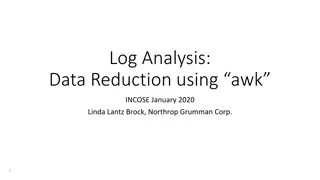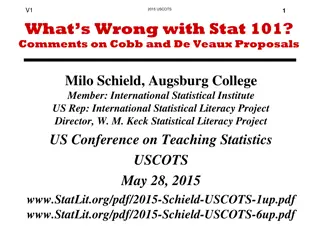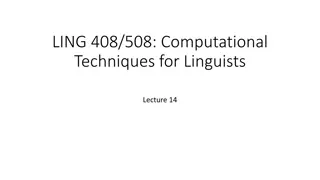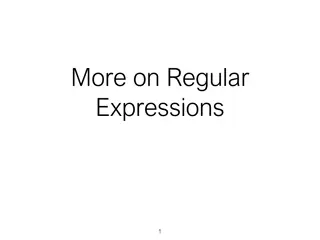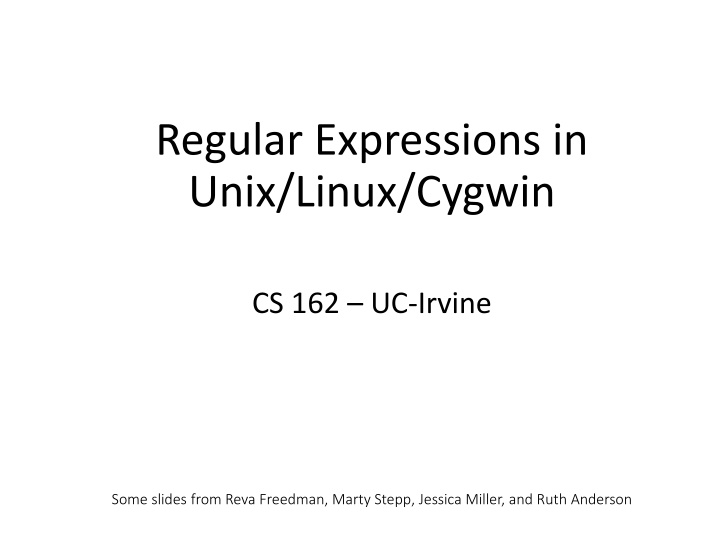
Regular Expressions in Unix/Linux: A Comprehensive Overview
Explore the fundamentals of regular expressions (RE) in Unix/Linux, covering formal definitions, egrep commands, metacharacters, wildcards, and anchors. Learn to effectively utilize regex patterns for powerful text searching and manipulation in your scripts and commands.
Download Presentation

Please find below an Image/Link to download the presentation.
The content on the website is provided AS IS for your information and personal use only. It may not be sold, licensed, or shared on other websites without obtaining consent from the author. If you encounter any issues during the download, it is possible that the publisher has removed the file from their server.
You are allowed to download the files provided on this website for personal or commercial use, subject to the condition that they are used lawfully. All files are the property of their respective owners.
The content on the website is provided AS IS for your information and personal use only. It may not be sold, licensed, or shared on other websites without obtaining consent from the author.
E N D
Presentation Transcript
Regular Expressions in Unix/Linux/Cygwin CS 162 UC-Irvine Some slides from Reva Freedman, Marty Stepp, Jessica Miller, and Ruth Anderson
Regular Expression (RE) Formal Definition Basis: single character, a, is an RE, signifying language {a}. is an RE, signifying language { is an RE, signifying language If E1and E2are REs, then E1|E2is an RE, signifying L(E1) U L(E2) If E1and E2are REs, then E1E2is an RE, signifying L(E1) L(E2), that is, concatenation If E is an RE, then E* is an RE, signifying L(E)*, that is, Kleene closure, which is the concatenation of 0 or more strings from L(E). Precedence is the the order of Kleene closure (highest), concatenation, and union (lowest) Parentheses can be used for grouping and don t count as characters. 2
egrep and regexes command description extended grep; uses regexes in its search patterns; equivalent to grep -E egrep egrep "[0-9]{3}-[0-9]{3}-[0-9]{4}" contact.html egrep searches for a regular expression pattern in a file (or group of files) grep uses basic regular expressions instead of extended extended has some minor differences and additional metacharacters -i option before regex signifies a case-insensitive match egrep -i "mart" matches "Marty S", "smartie", "WALMART", ...
Metacharacters RE Metacharacter Matches Any one character, except new line Any one of the enclosed characters (e.g. a-z) Zero or more of preceding character Zero or one of the preceding characters One or more of the preceding characters . [a-z] * ? or \? + or \+ any non-metacharacter matches itself 4
more Metacharacters RE Metacharacter Matches beginning of line end of line Escape the meaning of char following it One character not in the set Beginning of word anchor End of word anchor Tags matched characters to be used later (max = 9) Or grouping Repetition of character x, m times (x,m = integer) Repetition of character x, at least m times Repetition of character x between m and m times ^ $ \char [^] \< \> ( ) or \( \) | or \| x\{m\} x\{m,\} x\{m,n\} 5
Wildcards and anchors . (a dot) matches any character except \n ".oo.y" matches "Doocy", "goofy", "LooPy", ... use \. to literally match a dot . character ^ matches the beginning of a line; $ the end "^fi$" matches lines that consist entirely of fi \< demands that pattern is the beginning of a word; \> demands that pattern is the end of a word "\<for\>" matches lines that contain the word "for Words are made up of letters, digits and _ (underscore)
Special characters | means OR "abc|def|g" matches lines with "abc", "def", or "g" precedence of ^(Subject|Date) vs. ^Subject|Date: There's no AND symbol. () are for grouping "(Homer|Marge) Simpson" matches lines containing "Homer Simpson" or "Marge Simpson" \ starts an escape sequence many characters must be escaped to match them: / \ $ . [ ] ( ) ^ * + ? "\.\\n" matches lines containing ".\n"
Quantifiers: * + ? * means 0 or more occurrences "abc*" matches "ab", "abc", "abcc", "abccc", ... "a(bc)*" matches "a", "abc", "abcbc", "abcbcbc", ... "a.*a" matches "aa", "aba", "a8qa", "a!?_a", ... + means 1 or more occurrences "a(bc)+" matches "abc", "abcbc", "abcbcbc", ... "Goo+gle" matches "Google", "Gooogle", "Goooogle", ... ? means 0 or 1 occurrences "Martina?" matches lines with "Martin" or "Martina" "Dan(iel)?" matches lines with "Dan" or "Daniel"
More quantifiers {min,max} means between min and max occurrences "a(bc){2,4}" matches "abcbc", "abcbcbc", or "abcbcbcbc" min or max may be omitted to specify any number "{2,}" means 2 or more "{,6}" means up to 6 "{3}" means exactly 3
Character sets [ ] group characters into a character set; will match any single character from the set "[bcd]art" matches strings containing "bart", "cart", and "dart" equivalent to "(b|c|d)art" but shorter inside [ ], most modifier keys act as normal characters "what[.!*?]*" matches "what", "what.", "what!", "what?**!", ...
Character ranges inside a character set, specify a range of characters with - "[a-z]" matches any lowercase letter "[a-zA-Z0-9]" matches any lower- or uppercase letter or digit an initial ^ inside a character set negates it "[^abcd]" matches any character other than a, b, c, or d inside a character set, - can sometimes be tricky to match Try escaping it (use \) or place it last in the brackets "[+\-]?[0-9]+" matches optional + or -, followed by one digit
POSIX Character Sets POSIX added newer, portable ways to describe character sets: Note that some people use [[:alpha:]] as a notation, but the outer '[...]' specifies a character set. 12
Anchors Anchors tell where the next character in the pattern must be located in the text data. 13
Concatenation Operator In a sequence operator, if a series of atoms are shown in a regular expression, there is no operator between them. 14
Alternation Operator: | or \| operator (| or \| ) is used to define one or more alternatives Note: depends on whether using egrep or grep 15
Repetition Operator: {} or \{\} The repetition operator specifies that the atom or expression immediately before the repetition may be repeated. 16
Group Operator In the group operator, when a group of characters is enclosed in parentheses, the next operator applies to the whole group, not only the previous characters. Note: depends on egrep or grep - grep uses \( and \) 19
Grep detail and examples grep is family of commands grep (global regular expression print) common version egrep (extended grep) understands extended REs (| + ? ( ) don t need backslash) fgrep (fast grep) understands only fixed strings, i.e., is faster 20
Commonly used grep options: -c Print only a count of matched lines. -i Ignore uppercase and lowercase distinctions. -l List all files that contain the specified pattern. -n Print matched lines and line numbers. -s Work silently; display nothing except error messages. Useful for checking the exit status. -v Print lines that do not match the pattern. 21
Example: grep with pipe % ls -l | grep '^d' drwxr-xr-x 2 krush csci 512 Feb 8 22:12 assignments drwxr-xr-x 2 krush csci 512 Feb 5 07:43 feb3 drwxr-xr-x 2 krush csci 512 Feb 5 14:48 feb5 drwxr-xr-x 2 krush csci 512 Dec 18 14:29 grades drwxr-xr-x 2 krush csci 512 Jan 18 13:41 jan13 drwxr-xr-x 2 krush csci 512 Jan 18 13:17 jan15 drwxr-xr-x 2 krush csci 512 Jan 18 13:43 jan20 drwxr-xr-x 2 krush csci 512 Jan 24 19:37 jan22 drwxr-xr-x 4 krush csci 512 Jan 30 17:00 jan27 drwxr-xr-x 2 krush csci 512 Jan 29 15:03 jan29 % ls -l | grep -c '^d' 10 Pipe the output of the ls l command to grep and list/select only directory entries. Display the number of lines where the pattern was found. This does not mean the number of occurrences of the pattern. 22
Example: grep with \< \> % cat grep-datafile northwest NW Charles Main 300000.00 western WE Sharon Gray 53000.89 southwest SW Lewis Dalsass 290000.73 southern SO Suan Chin 54500.10 southeast SE Patricia Hemenway 400000.00 eastern EA TB Savage 440500.45 northeast NE AM Main Jr. 57800.10 north NO Ann Stephens 455000.50 central CT KRush 575500.70 Extra [A-Z]****[0-9]..$5.00 Print the line if it contains the word north . % grep '\<north\>' grep-datafile north NO Ann Stephens 455000.50 23
Example: grep with a\|b % cat grep-datafile northwest NW Charles Main 300000.00 western WE Sharon Gray 53000.89 southwest SW Lewis Dalsass 290000.73 southern SO Suan Chin 54500.10 southeast SE Patricia Hemenway 400000.00 eastern EA TB Savage 440500.45 northeast NE AM Main Jr. 57800.10 north NO Ann Stephens 455000.50 central CT KRush 575500.70 Extra [A-Z]****[0-9]..$5.00 Print the lines that contain either the expression NW or the expression EA % grep 'NW\|EA' grep-datafile northwest NW Charles Main 300000.00 eastern EA TB Savage 440500.45 Note: egrep works with | 24
Example: egrep with + % cat grep-datafile northwest NW Charles Main 300000.00 western WE Sharon Gray 53000.89 southwest SW Lewis Dalsass 290000.73 southern SO Suan Chin 54500.10 southeast SE Patricia Hemenway 400000.00 eastern EA TB Savage 440500.45 northeast NE AM Main Jr. 57800.10 north NO Ann Stephens 455000.50 central CT KRush 575500.70 Extra [A-Z]****[0-9]..$5.00 Print all lines containing one or more 3's. % egrep '3+' grep-datafile northwest NW Charles Main 300000.00 western WE Sharon Gray 53000.89 southwest SW Lewis Dalsass 290000.73 Note: grep works with \+ 25
Example: egrep with RE: ? % cat grep-datafile northwest NW Charles Main 300000.00 western WE Sharon Gray 53000.89 southwest SW Lewis Dalsass 290000.73 southern SO Suan Chin 54500.10 southeast SE Patricia Hemenway 400000.00 eastern EA TB Savage 440500.45 northeast NE AM Main Jr. 57800.10 north NO Ann Stephens 455000.50 central CT KRush 575500.70 Extra [A-Z]****[0-9]..$5.00 Print all lines containing a 2, followed by zero or one period, followed by a number. % egrep '2\.?[0-9]' grep-datafile southwest SW Lewis Dalsass 290000.73 Note: grep works with \? 26
Example: egrep with ( ) % cat grep-datafile northwest NW Charles Main 300000.00 western WE Sharon Gray 53000.89 southwest SW Lewis Dalsass 290000.73 southern SO Suan Chin 54500.10 southeast SE Patricia Hemenway 400000.00 eastern EA TB Savage 440500.45 northeast NE AM Main Jr. 57800.10 north NO Ann Stephens 455000.50 central CT KRush 575500.70 Extra [A-Z]****[0-9]..$5.00 Print all lines containing one or more consecutive occurrences of the pattern no . % egrep '(no)+' grep-datafile northwest NW Charles Main 300000.00 northeast NE AM Main Jr. 57800.10 north NO Ann Stephens 455000.50 Note: grep works with \( \) \+ 27
Example: egrep with (a|b) % cat grep-datafile northwest NW Charles Main 300000.00 western WE Sharon Gray 53000.89 southwest SW Lewis Dalsass 290000.73 southern SO Suan Chin 54500.10 southeast SE Patricia Hemenway 400000.00 eastern EA TB Savage 440500.45 northeast NE AM Main Jr. 57800.10 north NO Ann Stephens 455000.50 central CT KRush 575500.70 Extra [A-Z]****[0-9]..$5.00 Print all lines containing the uppercase letter S , followed by either h or u . % egrep 'S(h|u)' grep-datafile western WE Sharon Gray 53000.89 southern SO Suan Chin 54500.10 Note: grep works with \( \) \| 28
Example: fgrep % cat grep-datafile northwest NW Charles Main 300000.00 western WE Sharon Gray 53000.89 southwest SW Lewis Dalsass 290000.73 southern SO Suan Chin 54500.10 southeast SE Patricia Hemenway 400000.00 eastern EA TB Savage 440500.45 northeast NE AM Main Jr. 57800.10 north NO Ann Stephens 455000.50 central CT KRush 575500.70 Extra [A-Z]****[0-9]..$5.00 Find all lines in the file containing the literal string [A-Z]****[0-9]..$5.00 . All characters are treated as themselves. There are no special characters. % fgrep '[A-Z]****[0-9]..$5.00' grep-datafile Extra [A-Z]****[0-9]..$5.00 29
Example: Grep with ^ % cat grep-datafile northwest NW Charles Main 300000.00 western WE Sharon Gray 53000.89 southwest SW Lewis Dalsass 290000.73 southern SO Suan Chin 54500.10 southeast SE Patricia Hemenway 400000.00 eastern EA TB Savage 440500.45 northeast NE AM Main Jr. 57800.10 north NO Ann Stephens 455000.50 central CT KRush 575500.70 Extra [A-Z]****[0-9]..$5.00 Print all lines beginning with the letter n. % grep '^n' grep-datafile northwest NW Charles Main 300000.00 northeast NE AM Main Jr. 57800.10 north NO Ann Stephens 455000.50 30
Example: grep with $ % cat grep-datafile northwest NW Charles Main 300000.00 western WE Sharon Gray 53000.89 southwest SW Lewis Dalsass 290000.73 southern SO Suan Chin 54500.10 southeast SE Patricia Hemenway 400000.00 eastern EA TB Savage 440500.45 northeast NE AM Main Jr. 57800.10 north NO Ann Stephens 455000.50 central CT KRush 575500.70 Extra [A-Z]****[0-9]..$5.00 Print all lines ending with a period and exactly two zero numbers. % grep '\.00$' grep-datafile northwest NW Charles Main 300000.00 southeast SE Patricia Hemenway 400000.00 Extra [A-Z]****[0-9]..$5.00 31
Example: grep with \char % cat grep-datafile northwest NW Charles Main 300000.00 western WE Sharon Gray 53000.89 southwest SW Lewis Dalsass 290000.73 southern SO Suan Chin 54500.10 southeast SE Patricia Hemenway 400000.00 eastern EA TB Savage 440500.45 northeast NE AM Main Jr. 57800.10 north NO Ann Stephens 455000.50 central CT KRush 575500.70 Extra [A-Z]****[0-9]..$5.00 Print all lines containing the number 5, followed by a literal period and any single character. % grep '5\..' grep-datafile Extra [A-Z]****[0-9]..$5.00 32
Example: grep with [ ] % cat grep-datafile northwest NW Charles Main 300000.00 western WE Sharon Gray 53000.89 southwest SW Lewis Dalsass 290000.73 southern SO Suan Chin 54500.10 southeast SE Patricia Hemenway 400000.00 eastern EA TB Savage 440500.45 northeast NE AM Main Jr. 57800.10 north NO Ann Stephens 455000.50 central CT KRush 575500.70 Extra [A-Z]****[0-9]..$5.00 Print all lines beginning with either a w or an e . % grep '^[we]' grep-datafile western WE Sharon Gray 53000.89 eastern EA TB Savage 440500.45 33
Example: grep with [^] % cat grep-datafile northwest NW Charles Main 300000.00 western WE Sharon Gray 53000.89 southwest SW Lewis Dalsass 290000.73 southern SO Suan Chin 54500.10 southeast SE Patricia Hemenway 400000.00 eastern EA TB Savage 440500.45 northeast NE AM Main Jr. 57800.10 north NO Ann Stephens 455000.50 central CT KRush 575500.70 Extra [A-Z]****[0-9]..$5.00 Print all lines ending with a period and exactly two non-zero numbers. % grep '\.[^0][^0]$' grep-datafile western WE Sharon Gray 53000.89 southwest SW Lewis Dalsass 290000.73 eastern EA TB Savage 440500.45 34
Example: grep with x\{m\} % cat grep-datafile northwest NW Charles Main 300000.00 western WE Sharon Gray 53000.89 southwest SW Lewis Dalsass 290000.73 southern SO Suan Chin 54500.10 southeast SE Patricia Hemenway 400000.00 eastern EA TB Savage 440500.45 northeast NE AM Main Jr. 57800.10 north NO Ann Stephens 455000.50 central CT KRush 575500.70 Extra [A-Z]****[0-9]..$5.00 Print all lines where there are at least six consecutive numbers followed by a period. % grep '[0-9]\{6\}\.' grep-datafile northwest NW Charles Main 300000.00 southwest SW Lewis Dalsass 290000.73 southeast SE Patricia Hemenway 400000.00 eastern EA TB Savage 440500.45 north NO Ann Stephens 455000.50 central CT KRush 575500.70 35
Example: grep with \< % cat grep-datafile northwest NW Charles Main 300000.00 western WE Sharon Gray 53000.89 southwest SW Lewis Dalsass 290000.73 southern SO Suan Chin 54500.10 southeast SE Patricia Hemenway 400000.00 eastern EA TB Savage 440500.45 northeast NE AM Main Jr. 57800.10 north NO Ann Stephens 455000.50 central CT KRush 575500.70 Extra [A-Z]****[0-9]..$5.00 Print all lines containing a word starting with north . % grep '\<north' grep-datafile northwest NW Charles Main 300000.00 northeast NE AM Main Jr. 57800.10 north NO Ann Stephens 455000.50 36
Example: egrep with linux.words /usr/share/dict % egrep -i '^x.*x$' linux.words Xerox xerox xix xx xxx xylanthrax Print all words that begin and end with x . 37
Example: egrep with linux.words /usr/share/dict % egrep '.*sex.*' linux.words | wc 325 325 3564 Counts all words that have sex as a substring Some of the 325 words: Essexville misexample misexecute misexecution misexpectation misexpend misexpenditure misexplain misexplained misexplanation 38
Example: egrep with linux.words /usr/share/dict % egrep '.*b.*b.*b.*b.*' linux.words Lists words that have at least 4 b s in them Some of the 25 words: beerbibber bibble-babble blood-bedabbled bubble-bow bubblebow bubbybush bumblebomb double-bubble flibbertigibbet flibbertigibbets flibbertigibbety gibble-gabble gibblegabble gibble-gabbler gibblegabbler hubble-bubble 39


